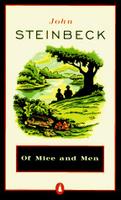Of Mice and Men

Of Mice and Men
John Steinbeck
"But, Mousie, thou art no thy lane,
In proving foresight may be vain;
The best-laid schemes o' mice an 'men ....................Robert Burns
This is one title that keeps popping up and each time, I would wonder what's the hoo-haa about this book. Well, the answer is obvious for any reader.
This book actually reminded me of an Irish play I watched in Beijing (Waiting for Godot by Samuel Beckett). It has the same absurdity although I doubt that it should be in the same category, but Of Mice and Men certainly does have quite an unusual form for a fictional story. As for the resulting feeling after reading the book, it leaves that similar feeling after watching the Beckett play. It leaves you disturbed (in certain extreme, depressing), a vague emptiness and pity for human life and in a nutshell, sad. I definitely welcome such feelings at intervals, since it gives access to different perspective of thoughts.
George and Lennie dreams of something that current society might find inspiring in its simplicity. The simplicity of wanting a place to call their own, security in knowing where your meals come from, reaping the hard earned rewards of a harvest etc. I especially liked the way both of them imagines and visualizes their dream, full with details, as if they've already seen it.
George and Lennie is also a contrast from the rest of the guys who work on the ranches. They can perhaps represent the idealist in a realistic world, the admirable idiots who are fighting for a dream. Another is the bond they have for each other. Especially how the simple minded Lennie depends on Georgeand how George seem to provide him unconditional brotherly love. Which leads me to the ending (for people who is interested to read this book, the following will be a BIG BIG SPOILER!)
I am still unable to grasp the intention of George shooting Lennie dead. To make it a fast death since the rest were already going to kill him? To get rid of him once and for all? Mercy killing? I guess it is a combination of all that. Is it a representation that Steinbeck felt there is no place for innocence in this world? By killing Lennie, George in a way forgoes the dream and tears down the ideal. It also tears down the difference he had over the rest.
Steinbeck in his characters portrays the loneliness of human life. Other than George and Lennie who has each other, everyone else is going about alone finding a place in the world. Although the story is set during the Great Depression in California, it can crudely be applied to current society. It has the similar setting where the strong forces their power over the weak, what is called predatory instincts. Capitalism perhaps utilizes this human nature and plays its role in strengthening this human behavior. To put it even more cruelly, this is the revolution of the “survival of the fittest” theory in the human world, though in current reality, strength in the modern world comes in term of money and power.
It is a very short read, like 103 pages? (yes, nice big letterings). It's short, but when I read the last sentence in a hawker stall in Ipoh (with Ming Kai by my side, I insisted to him that it is so mesmerising that I can't wait to know the ending, and as a bookworm himself, understood quite perfectly), I had that familar feeling of wishing it would go on, but then, it could not have chosen a more approriate ending.


0 Comments:
Post a Comment
<< Home